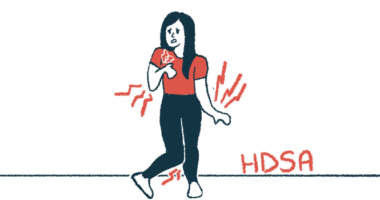SRX246 for Huntington’s disease
Last updated Nov. 15, 2024, by Marisa Wexler, MS

What is SRX246 for Huntington’s disease?
SRX246 is an investigational oral therapy that was being developed by Azevan Pharmaceuticals to help reduce irritability and aggressive behavior in people with Huntington’s disease.
The treatment was granted orphan drug and fast track designations in the U.S. for Huntington’s. Orphan drug status provides economic incentives for companies developing therapies for rare disorders, while a fast track designation aims to speed the development and regulatory review of treatments that may fill unmet medical needs in serious conditions.
Azevan also announced plans to develop SRX246 for other neuropsychiatric conditions. While the therapy showed some positive results in a Huntington’s Phase 2 clinical trial that ended in 2018, Azevan has made no announcements about the status of any of its clinical programs for several years now.
Therapy snapshot
| Treatment name: | SRX246 |
| Administration: | Tested in Huntington’s as an oral capsule |
| Clinical testing: | Completed a Phase 2 clinical trial; development program seems to have been discontinued |
How does SRX246 work in Huntington’s disease?
Huntington’s is a genetic disorder that causes progressive damage to the brain, resulting in symptoms such as abnormal movements, progressive cognitive decline, and behavior problems.
Unusual irritability and aggressive behaviors are often some of the earliest symptoms, being apparent well before the disease’s hallmark motor symptoms. These neuropsychiatric symptoms, affecting up to 70% of Huntington’s patients, can cause substantial distress for patients and those around them.
SRX246 is an orally available small molecule designed to block the activity of arginine vasopressin, or simply vasopressin, a molecule released in the brain for communication between nerve cells and implicated in the psychological stress response.
The experimental therapy specifically blocks the V1a receptor, the most abundant subtype of vasopressin receptor proteins in the brain, especially in areas involved in managing stress and aggression. By blocking this receptor protein, SRX246 is thought to reduce vasopressin signaling, ultimately lowering feelings of irritability and aggressive behaviors in Huntington’s patients.
How was SRX246 administered in Huntington’s disease?
In the single trial that tested the therapy in Huntington’s patients, an oral capsule, containing 120 mg or 160 mg of SRX246, was taken twice a day.
SRX246 in Huntington’s disease clinical trials
Azevan sponsored a U.S.-based Phase 2 clinical trial called STAIR (NCT02507284) to investigate SRX246’s tolerability, safety, and activity in Huntington’s patients, 18 and older, with irritability.
All were “mildly irritable” and/or “mildly aggressive” as reflected by a score of two or more points on the irritability question and/or the aggression question of the composite Unified Huntington’s Disease Rating Scale, a validated measure of motor, cognitive, and behavior symptoms.
The study enrolled a total of 106 participants (mean age of 50 years), who were randomly assigned to take an oral capsule of SRX246, at a dose of 120 or 160 mg, or a placebo, twice daily for 12 weeks (about three months).
Those assigned the SRX246 were given 80 mg twice a day for the first two weeks and, if well tolerated, the dose was increased to 120 mg for the following four weeks, after which it was maintained or increased to 160 mg for the remaining six weeks.
Results showed SRX246 was generally safe and well tolerated, without reports of treatment-related serious adverse events, meeting the trial’s primary and secondary goals. SRX246 treatment did not appear to be associated with worsening of apathy or suicidal thoughts and behaviors, which are side effects of certain treatments commonly used for Huntington’s.
Exploratory analyses looked at changes in problematic behaviors, assessed with validated measures and records from patients and caregivers on mood, irritability, and aggressive behavior.
Results indicated the proportion of patients exhibiting violent behaviors (hitting someone or something) was reduced after three months for SRX246-treated patients (53% vs. 37%), while it remained generally stable in the placebo group (24% vs. 33%). This difference between SRX246 and placebo groups was statistically significant.
Among a subgroup of patients with higher disease burden, a significantly higher proportion of those given SRX246 experienced fewer aggressive events (hitting or yelling) than those on a placebo (65% vs. 22%). The SRX246-associated decrease in aggressive behaviors was particularly pronounced among the subset of patients with relatively advanced Huntington’s (stage 2 or 3) and a previous history of violent behaviors.
Measures of Huntington’s-related life quality, anxiety, and caregiver burden did not substantially change during the study, irrespective of whether patients were given SRX246 or a placebo.
Common side effects of SRX246
In the Phase 2 study of SRX246 in Huntington’s patients, adverse events reported more commonly with the experimental therapy compared with the placebo included:
- nausea
- fatigue
- headache
- increased levels of liver enzymes (a marker of liver damage)
- falls
- depressed mood.
Huntington’s Disease News is strictly a news and information website about the disease. It does not provide medical advice, diagnosis, or treatment. This content is not intended to be a substitute for professional medical advice, diagnosis, or treatment. Always seek the advice of your physician or other qualified health provider with any questions you may have regarding a medical condition. Never disregard professional medical advice or delay in seeking it because of something you have read on this website.
Recent Posts
- What I want medical students to know about Huntington’s and bias
- Ingrezza treatment eases disease burden due to Huntington’s chorea
- A murder trial opened my eyes about Huntington’s and face reading
- What I want people to stop saying about Huntington’s disease
- HDSA 2025: Dance classes may improve balance in Huntington’s
- HDSA 2025: Long-term care transition requires communication
- Guest Voice: Huntington’s disease is rare, but love isn’t
- HDSA 2025: Observational studies in Huntington’s now enrolling in US
- HDSA 2025: Speakers spotlight Huntington’s clinical trials
- HDSA 2025: Speech therapy can help Huntington’s disease patients
Related articles





